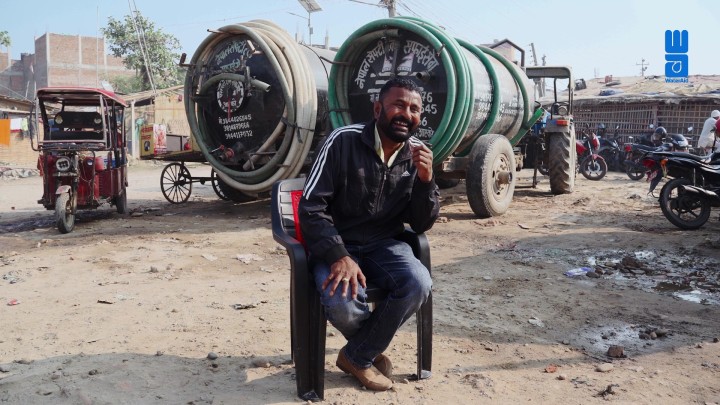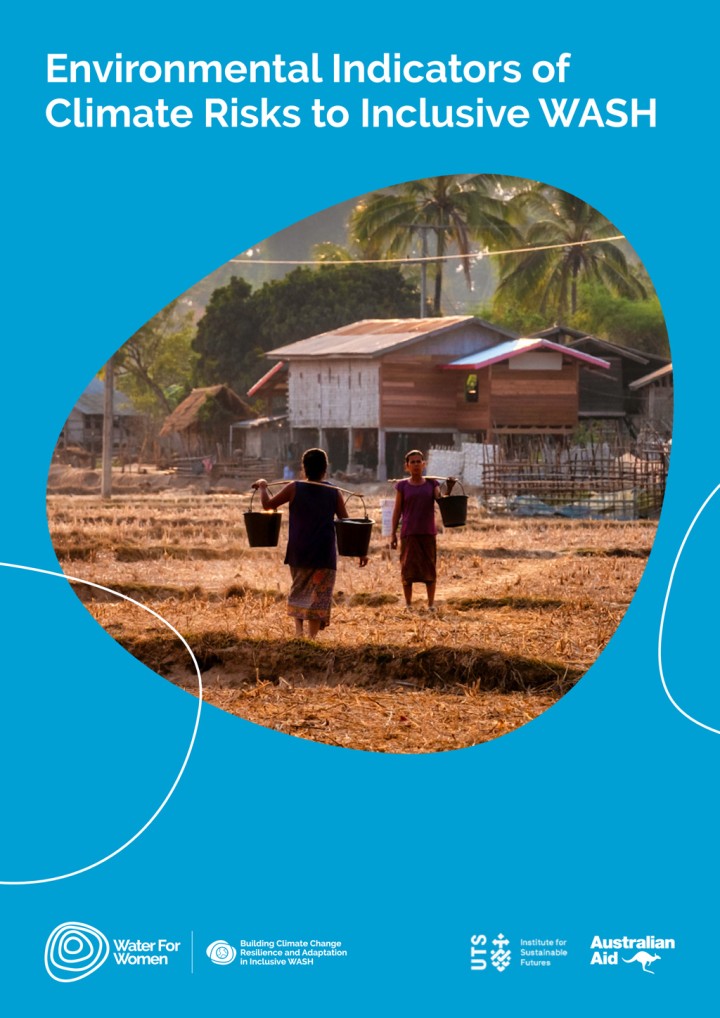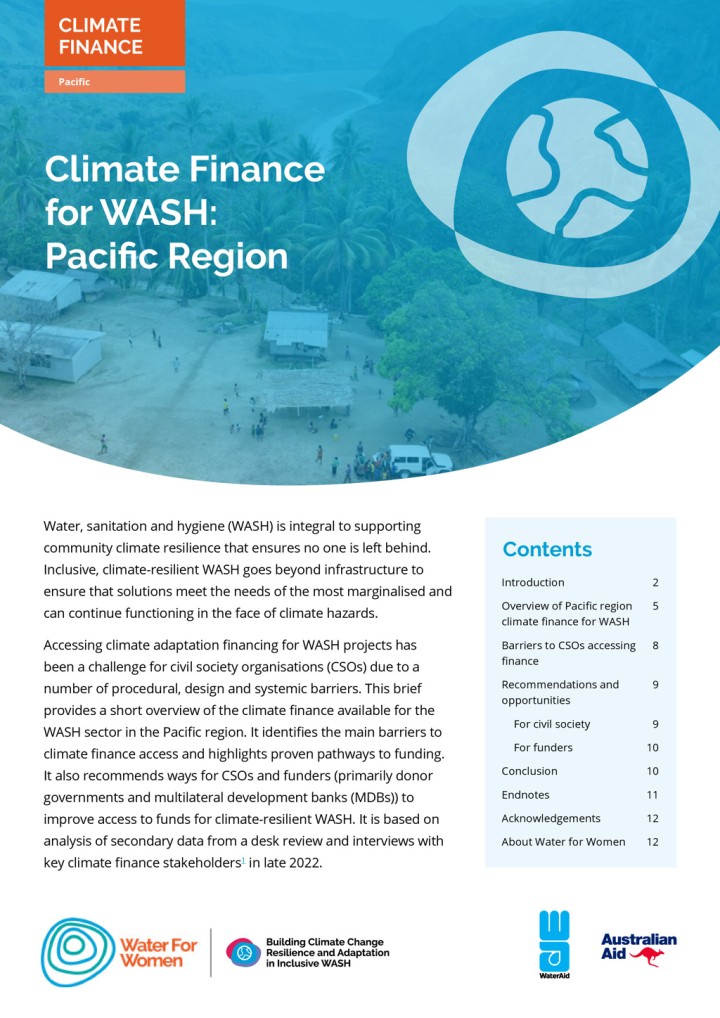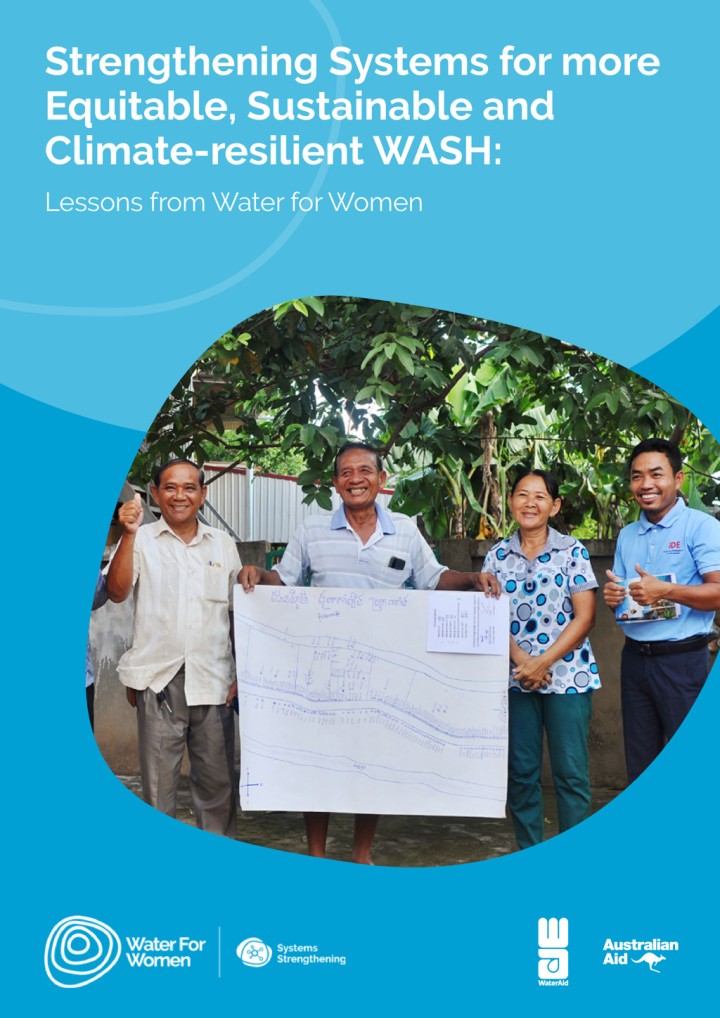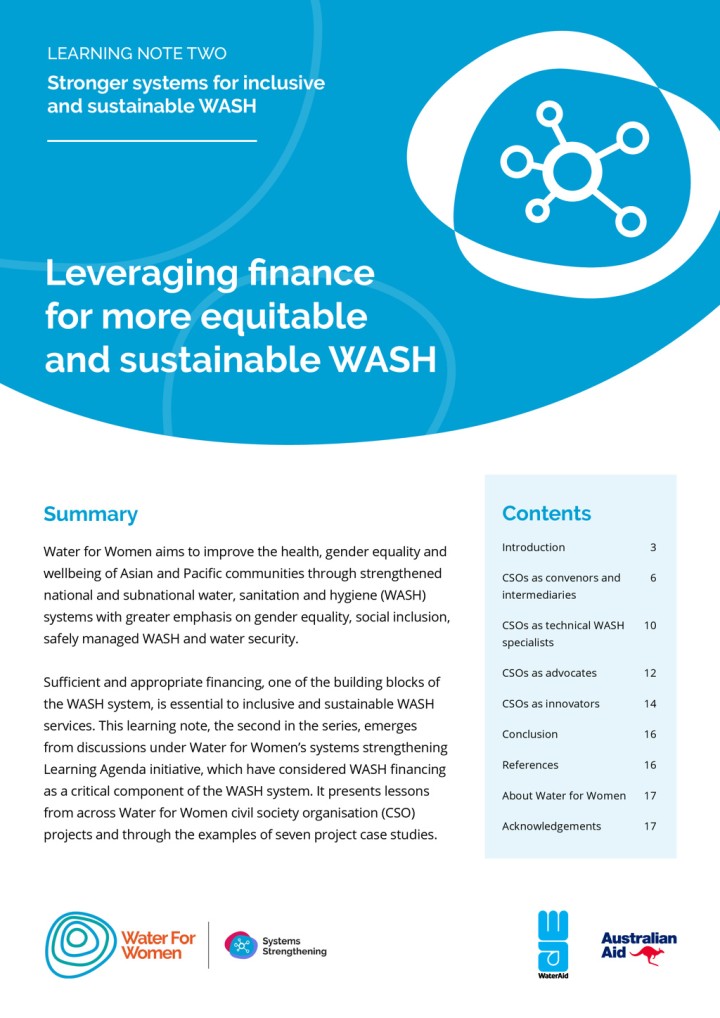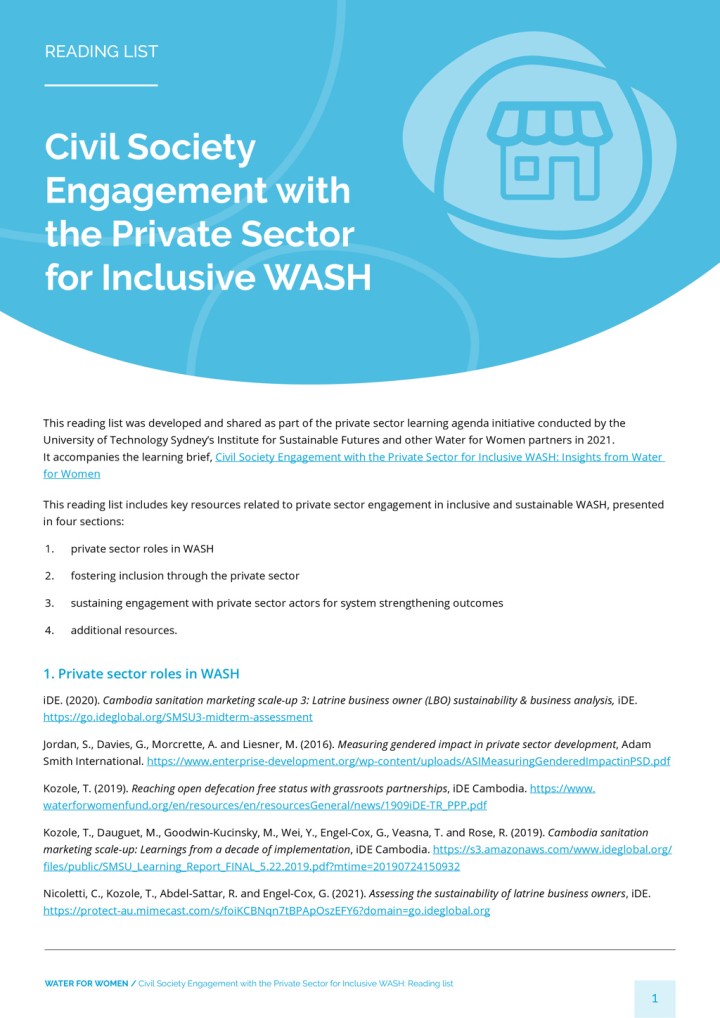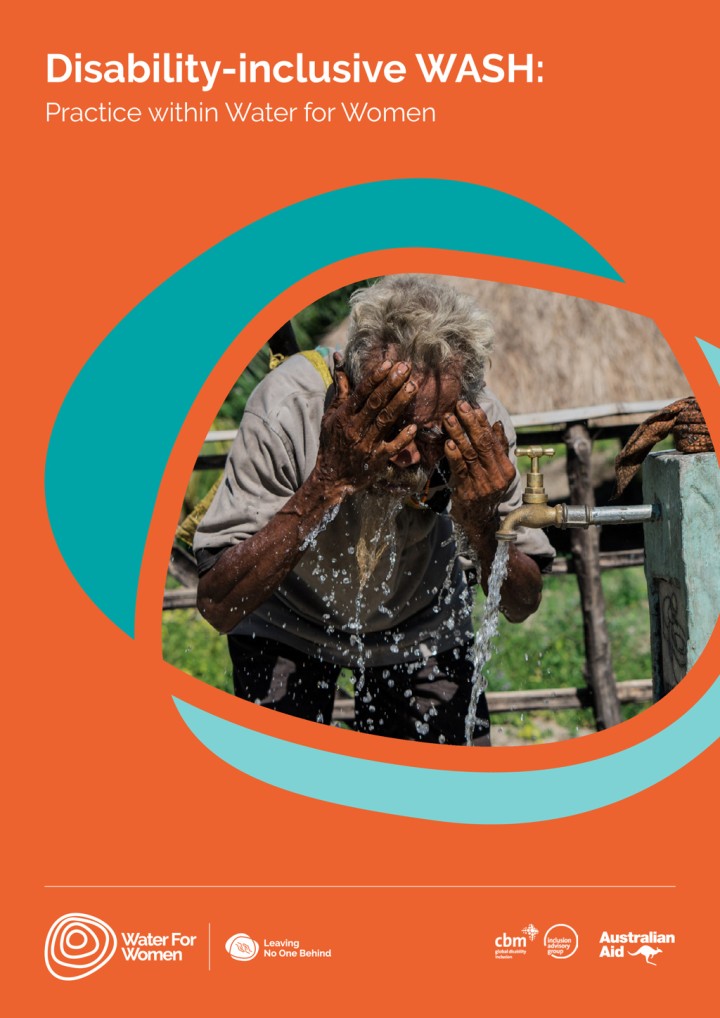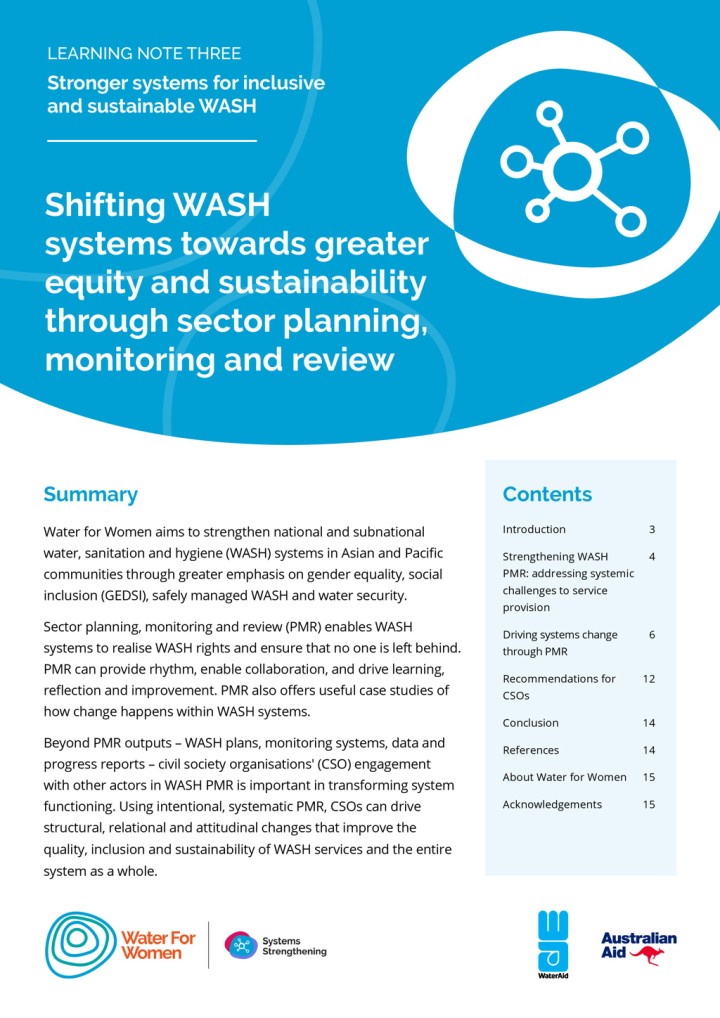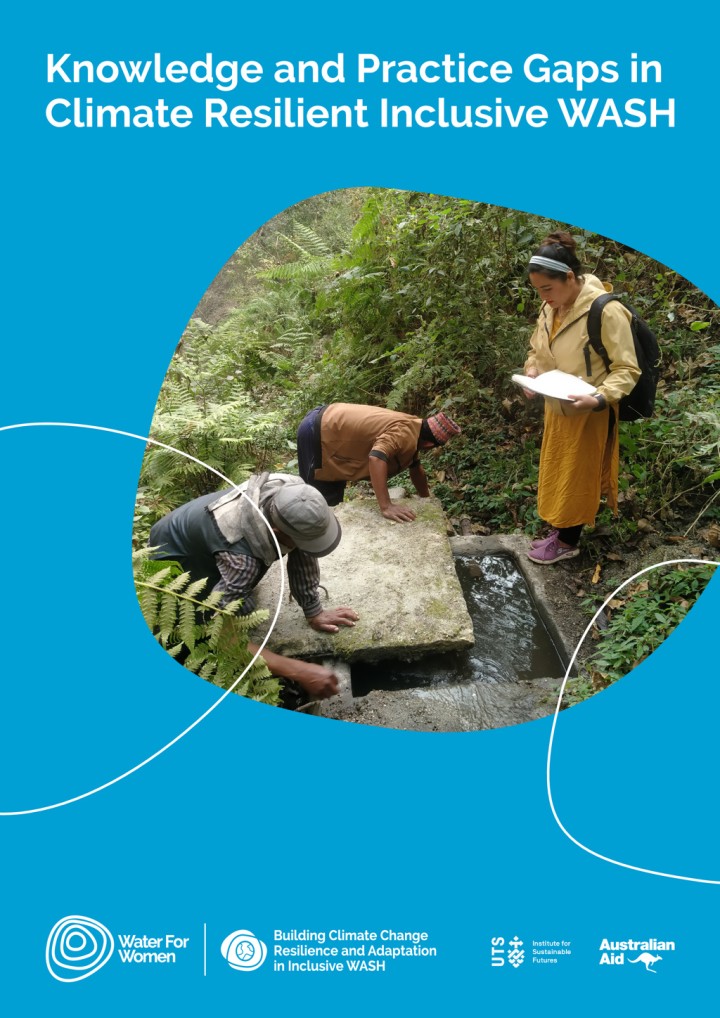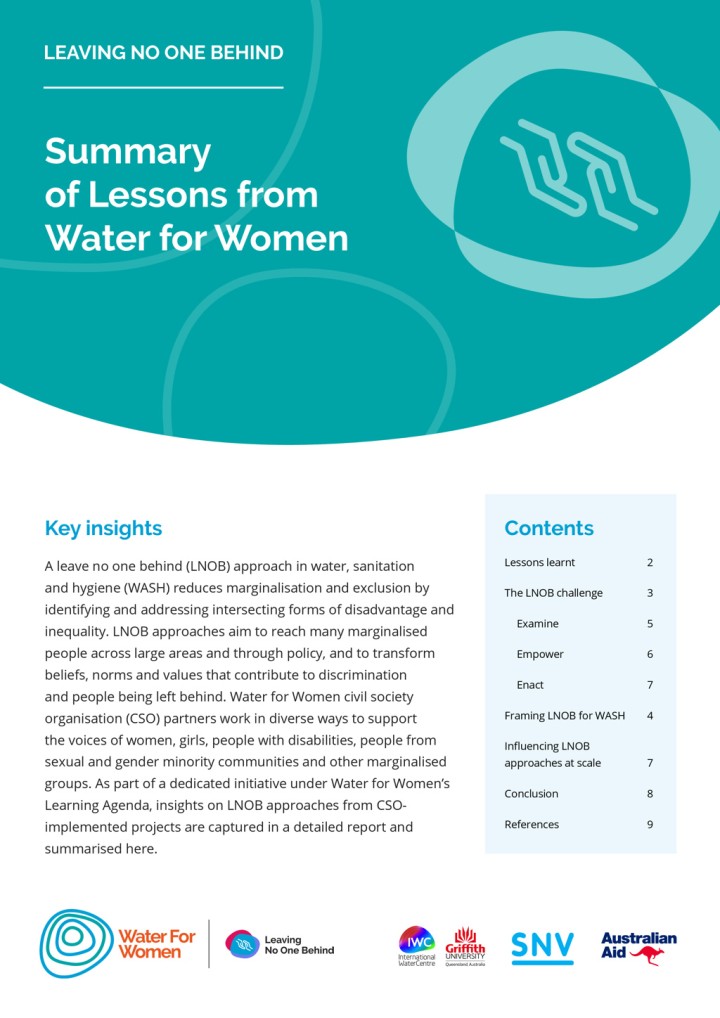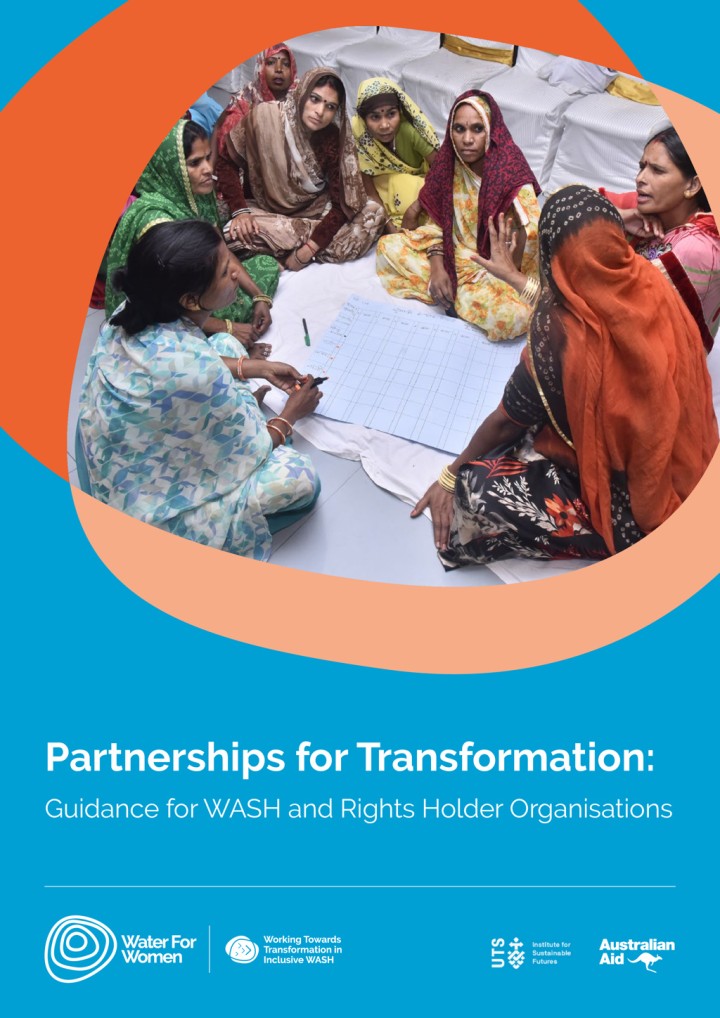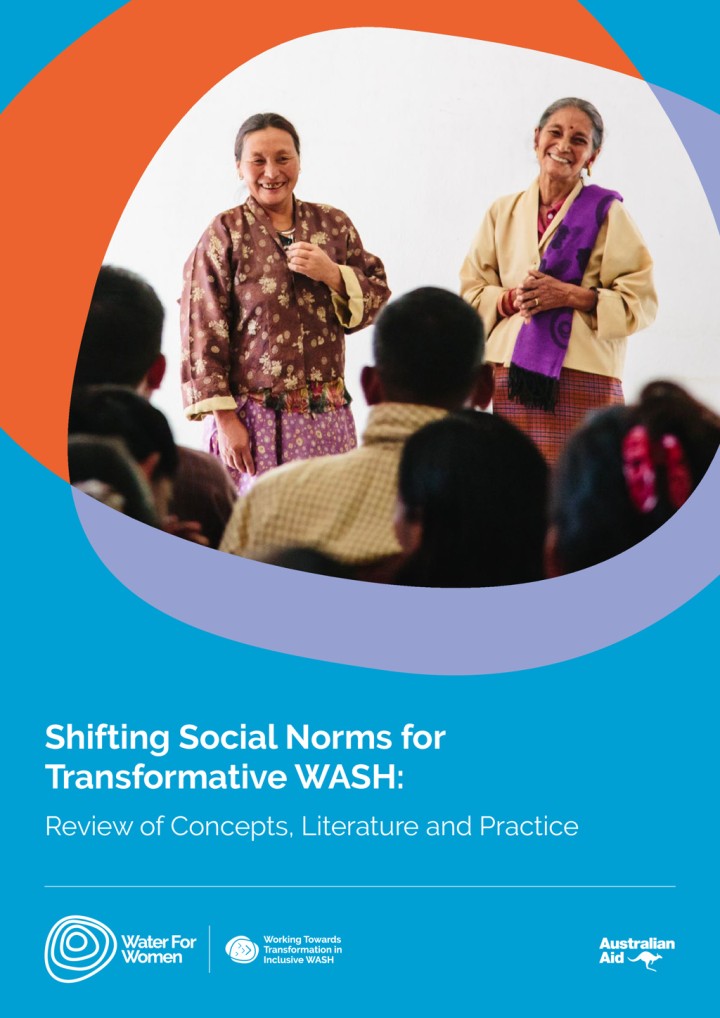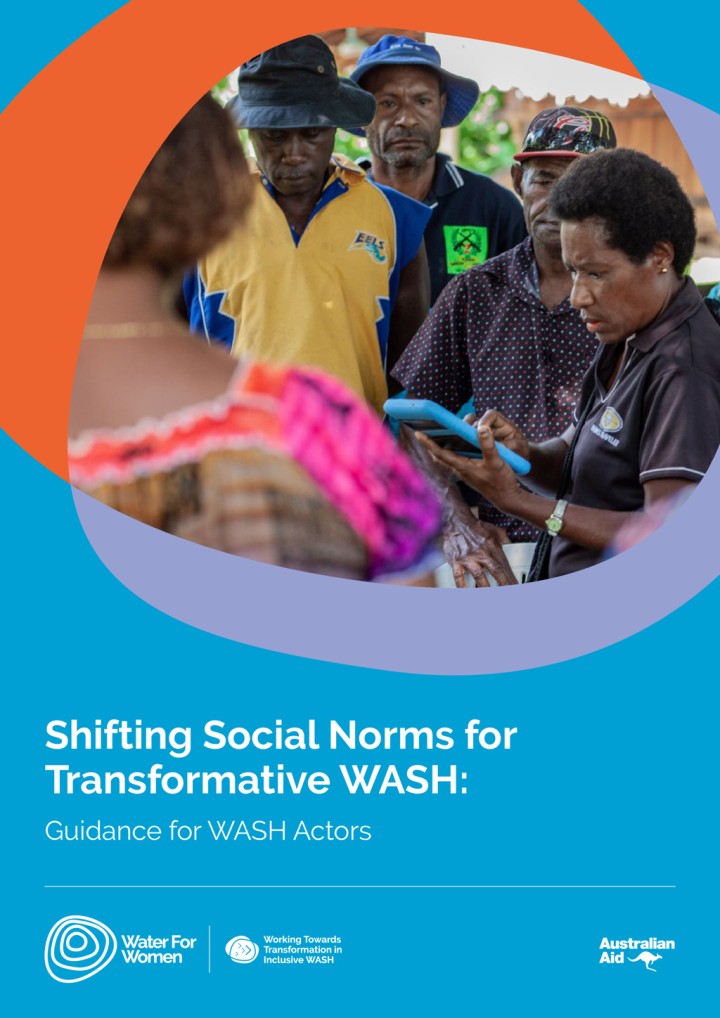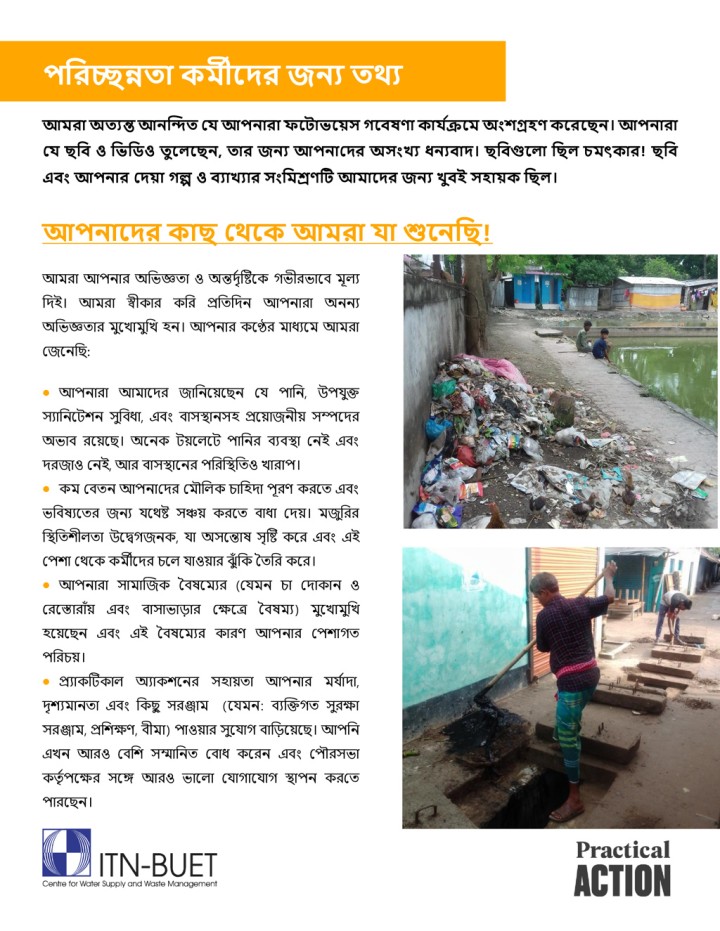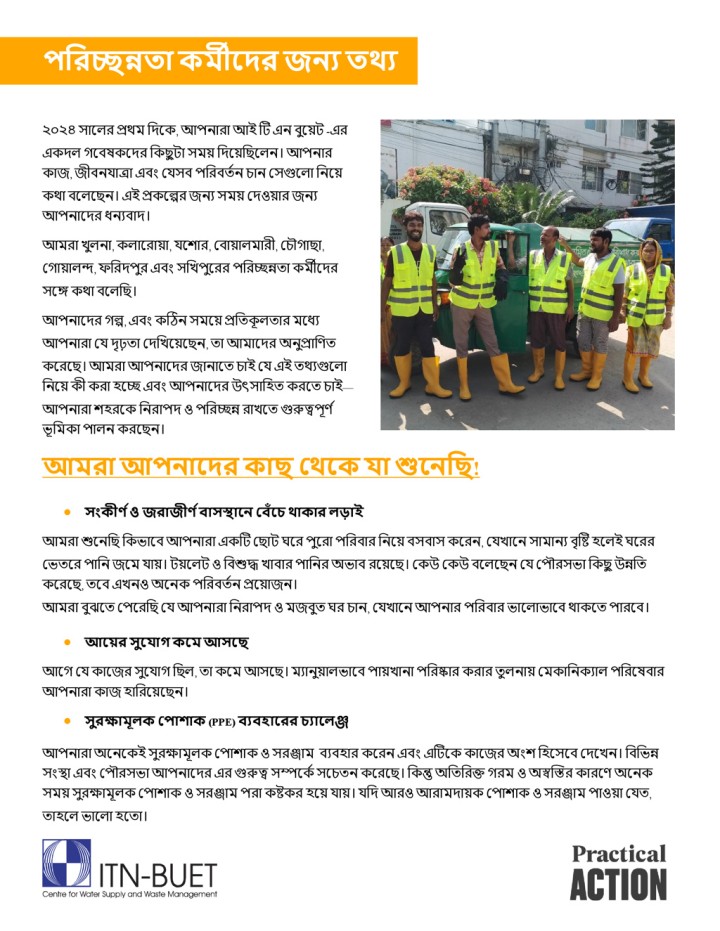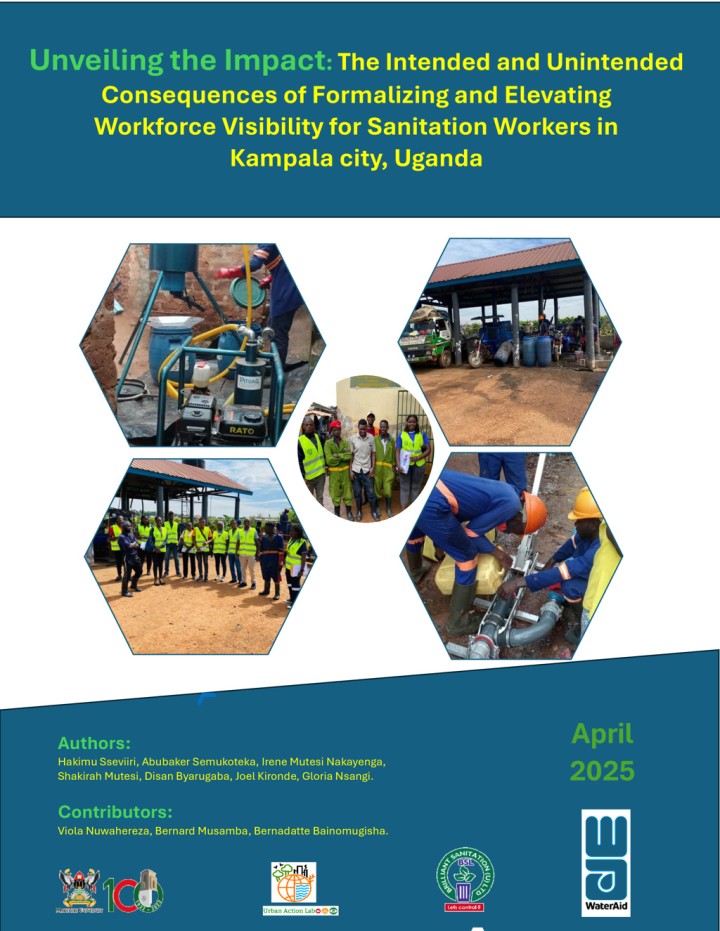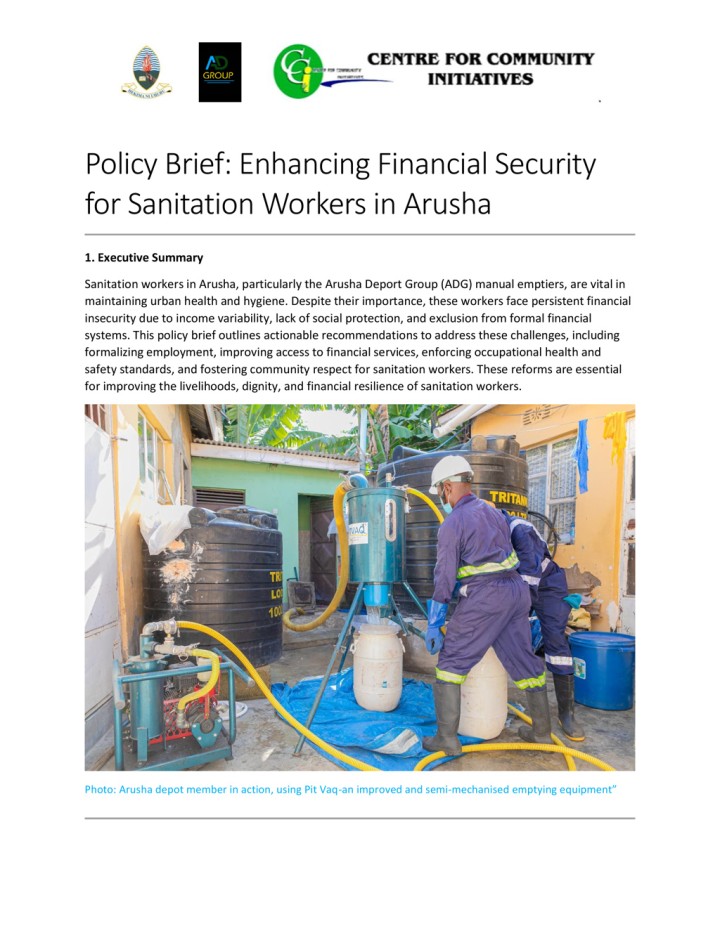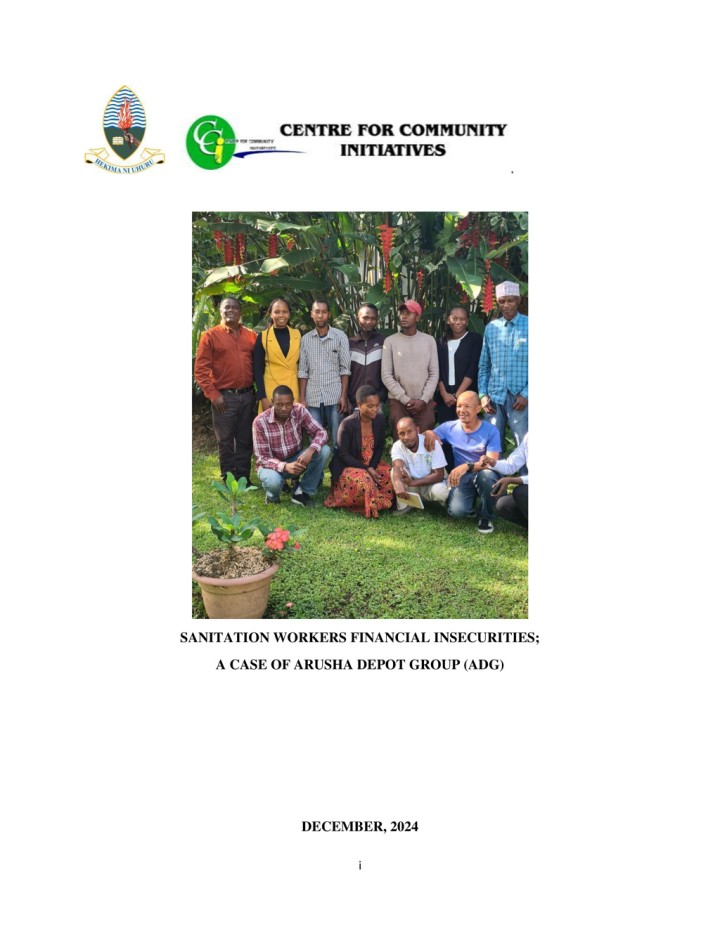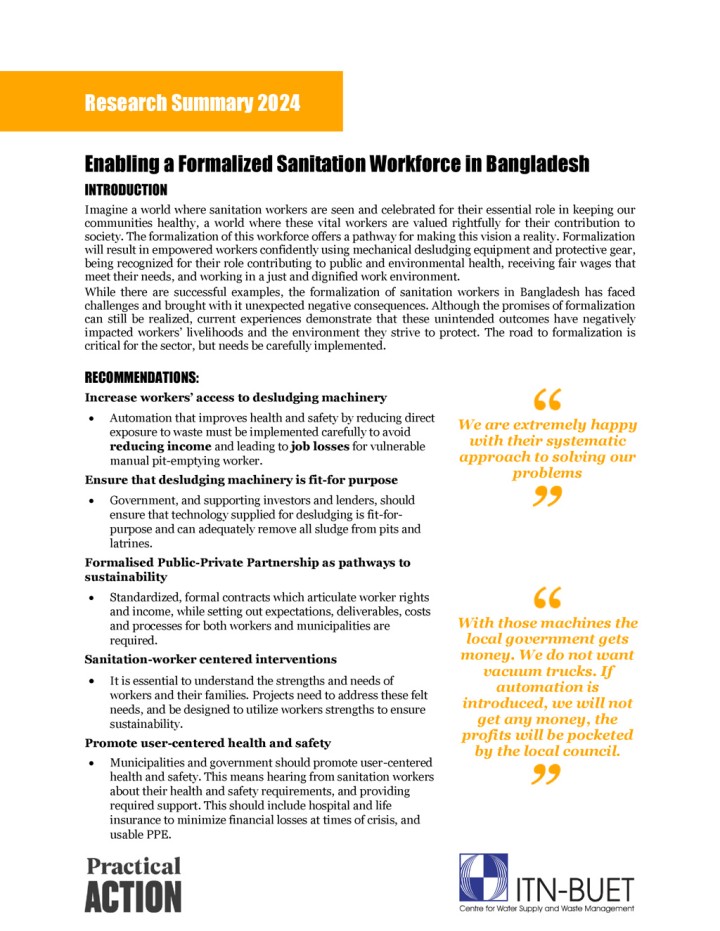Aarzoo Nepal and Sneha Jha (2025) Weight of the Waste: Story of Sanitation Workers
This film is more than just a story; it is a raw and honest portrayal of the daily realities faced by these essential individuals. It delves into their immense challenges, the pervasive social stigma and discrimination they endure, often leading to their isolation and dehumanization. The documentary poignantly shows how many are compelled to hide their identities, fearing judgment and ostracization from society.Yet, amidst these […]
Water for Women (2023) Environmental Indicators of Climate Risks to Inclusive WASH
This learning resource summarises a range of indicators that WASH service authorities and their civil society organisations (CSOs) can use to monitor the key risks of six climate hazards to household WASH access. Specifically, the indicators pertain to changes in the natural or built environment that may be outside the sphere of control of a WASH program.
Water for Women (2023) Climate Finance for WASH: Pacific Region
Accessing climate adaptation financing for WASH projects has been a challenge for civil society organisations due to a number of procedural, design and systemic barriers. To address this challenge, a consortium of Water for Women partners developed a series of briefs on climate finance for the WASH sector in Asia and the Pacific. The Pacific regional brief is available along with five country-specific briefs.
Water for Women (2023) Strengthening Systems for more Equitable, Sustainable and Climate-resilient WASH: Lessons from Water for Women
This systems strengthening series shares lessons from Water for Women about how CSOs and research organisations can contribute to stronger systems for inclusive and sustainable WASH.
Fraser Goff (2022) Learning Note 2: Leveraging finance for more equitable and sustainable WASH
Water for Women aims to improve the health, gender equality and wellbeing of Asian and Pacific communities through strengthened national and subnational water, sanitation and hygiene (WASH) systems with greater emphasis on gender equality, social inclusion, safely managed WASH and water security. Sufficient and appropriate financing, one of the building blocks of the WASH system, is essential to inclusive and sustainable WASH services. This learning […]
Water for Women (2022) Civil Society Engagement with the Private Sector for Inclusive WASH: Reading List
This reading list was developed and shared as part of the private sector learning agenda initiative conducted by the University of Technology Sydney’s Institute for Sustainable Futures and other Water for Women partners in 2021. It accompanies the learning brief, Civil Society Engagement with the Private Sector for Inclusive WASH: Insights from Water for Women.
Water for Women (2022) Civil Society Engagement with the Private Sector for Inclusive WASH: Insights from Water for Women
This learning brief brings together the knowledge, experience and insights of water, sanitation and hygiene (WASH) sector civil society organisations (CSOs) in engaging with private sector actors in South Asia and South East Asia to foster gender equality, disability and social inclusion (GEDSI), sustainability of WASH programs, and critical thinking. It covers: • the various roles of the private sector in WASH service delivery systems • key […]
Water for Women (2022) Disability-inclusive WASH: Practice within Water for Women
This learning brief explores key lessons learnt from implementing disability-inclusive WASH projects and research across Water for Women – in particular, strategies that contribute to meaningful participation and equality of outcomes.
Fraser Goff (2022) Learning Note 3: Shifting WASH systems towards greater equity and sustainability through sector planning, monitoring and review
Water for Women aims to strengthen national and subnational water, sanitation and hygiene (WASH) systems in Asian and Pacific communities through greater emphasis on gender equality, social inclusion (GEDSI), safely managed WASH and water security. Sector planning, monitoring and review (PMR) enables WASH systems to realise WASH rights and ensure that no one is left behind. PMR can provide rhythm, enable collaboration, and drive learning, […]
Water for Women (2022) Knowledge and Practice Gaps in Climate Resilient Inclusive WASH
This report outlines the unique strengths and contributions that Water for Women can make to building climate change resilience and adaptation in inclusive water, sanitation and hygiene (WASH), through contributions to the regional and global WASH sector and enhanced internal capacity.
Bronwyn Powell; Gabrielle Halcrow (2022) Leaving No One Behind: Summary of Lessons from Water for Women
A leave no one behind (LNOB) approach in water, sanitation and hygiene (WASH) reduces marginalisation and exclusion by identifying and addressing intersecting forms of disadvantage and inequality. LNOB approaches aim to reach many marginalised people across large areas and through policy, and to transform beliefs, norms and values that contribute to discrimination and people being left behind. Water for Women civil society organisation (CSO) partners […]
Water for Women (2022) Partnerships for Transformation: Guidance for WASH and Rights Holder Organisations
This guidance offers insights into effective partnerships between water, sanitation and hygiene (WASH) sector organisations and rights holder organisations (RHOs). It provides practical recommendations for effective collaboration in all types of partnerships and is designed to support organisations looking to begin, build or strengthen partnerships to achieve mutually beneficial outcomes.
Water for Women (2022) Shifting Social Norms for Transformative WASH: Review of Concepts, Literature and Practice
This review, along with the allied guidance, is intended to support WASH actors with relevant examples of how to change harmful and exclusionary social norms in the context of WASH programming. WASH organisations are those that wholly or mostly work on WASH, in forms including advocacy, infrastructure, governance, finance, capacity development and behaviour change. This review is intended for those who would like to take […]
Water for Women (2022) Shifting Social Norms for Transformative WASH: Guidance for WASH Actors
This review, along with the allied guidance, is intended to support WASH actors with relevant examples of how to change harmful and exclusionary social norms in the context of WASH programming. WASH organisations are those that wholly or mostly work on WASH, in forms including advocacy, infrastructure, governance, finance, capacity development and behaviour change. This review is intended for those who would like to take […]
ITN-BUET Centre for Water Supply and Waste Management (2024) পরিচ্ছন্নতা কর্মীদেি জন্য তথ্য
আর্মিা অতযন্তআন্ন্দিত যেআপনারা ফদ াভদ়েস গদেষণা কাে যক্রদর্ম অংশগ্রহণ কদিদেন্।আপনারা যে েরে ও রভরিও তুদেদেন্, তাি জন্য আপন্াদের অসংখ্য ধন্যোে। ছবিগুল া রেে চর্মৎকাি েরে এেং আপন্াি যে়ো গল্প ও েযাখ্যাি সংরর্মশ্রণট আমালের জনয খ্ুেই সহা়েক রেে। আপনালের কাে যথ্দক আর্মিা ো শুদন্রে আমরা আপনার অভিজ্ঞতা ও অন্তর্দৃষ্টিকে গিীরিাকে মূল্য ভর্ই। আমরা স্বীোর েভর প্রভতভর্ন আপনারা অননয অভিজ্ঞতার মুকিামুভি হন। আপনার েকের মাধ্যকম আমরা জেননভি: • […]
ITN-BUET Centre for Water Supply and Waste Management (2024) পরিচ্ছন্নতা কর্মীদেি জন্য তথ্য
২০২৪ সালের প্রথম দিলে, আপনারা আই টি এন বুয়েি -এর একদল গলেষেলির ককছু িা সমে কদয়েকছয়লন। আপনারো জ, জীেনযাত্রা এেং যযসে পদরের্তন চান যসগুলো দনলেে থা েলেলেন। এই প্রেলের জনয সমে যিওোর জনয আপনালির ধনযোি। আমরা খুেনা, েোলরাো, যল ার, যোোেমারী, যচৌগাো, যগাোেন্দ, ফদরিপুর এেং সদখপুলরর পদরচ্ছন্নর্া েমীলির সলে েথা েলেদে। আপনালির গে, এেং কটিন সময়ে প্রদর্েূ ের্ার মলধয আপনারা যয িৃঢ়র্া যিদখলেলেন, র্া আমালির অনুপ্রাদির্ে […]
Hakimu Sseviiri; Abubaker Semukoteka; Irene Mutesi Nakayenga; Shakirah Mutesi; Disan Byarugaba; Joel Kironde; Gloria Nsangi (2025) Unveiling the Impact: The Intended and Unintended Consequences of Formalizing and Elevating Workforce Visibility for Sanitation Workers in Kampala city, Uganda
Sanitation services are pivotal not only for enhancing public health but also for fostering the productivity of urban systems, particularly as cities continue to expand. Amidst efforts by public, private, and civil society actors to engage the sanitation sector through decentralized and small-scale service provision models, significant challenges related to workforce welfare, legitimacy, and adequate financing persist, underscoring the need to recognize and support the […]
Center for Community Initiatives () Policy Brief: Enhancing Financial Security for Sanitation Workers in Arusha
Sanitation workers in Arusha, particularly the Arusha Deport Group (ADG) manual emptiers, are vital in maintaining urban health and hygiene. Despite their importance, these workers face persistent financial insecurity due to income variability, lack of social protection, and exclusion from formal financial systems. This policy brief outlines actionable recommendations to address these challenges, including formalizing employment, improving access to financial services, enforcing occupational health and […]
Center for Community Initiatives (2024) Sanitation Workers Financial Insecurities A Case of Arusha Depot Group (ADG)
Sanitation work in Arusha plays a critical role in maintaining urban health and hygiene, but it has historically been underappreciated and, at times, stigmatized. The sanitation workers, oftenengaged in manual emptying, street sweeping, and sewer system maintenance, belong to an informal workforce that faces significant challenges, particularly financial insecurity and lack of recognition. This study provides a comprehensive analysis of the financial insecurity faced by sanitation […]
ITN-BUET Centre for Water Supply and Waste Management (2024) Enabling a Formalized Sanitation Workforce in Bangladesh Research Summary
Imagine a world where sanitation workers are seen and celebrated for their essential role in keeping our communities healthy, a world where these vital workers are valued rightfully for their contribution to society. The formalization of this workforce offers a pathway for making this vision a reality. Formalization will result in empowered workers confidently using mechanical desludging equipment and protective gear, being recognized for their […]
